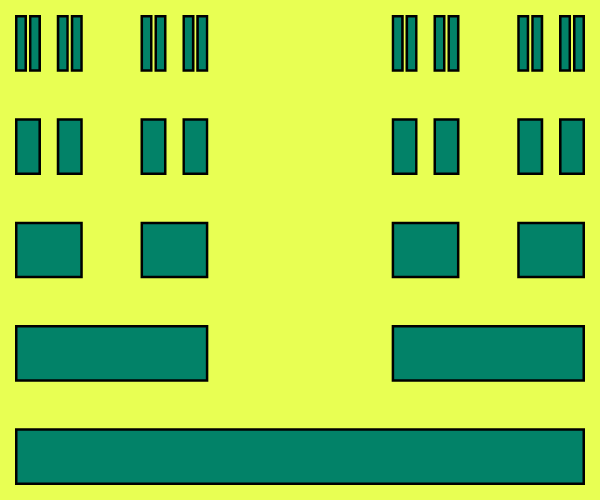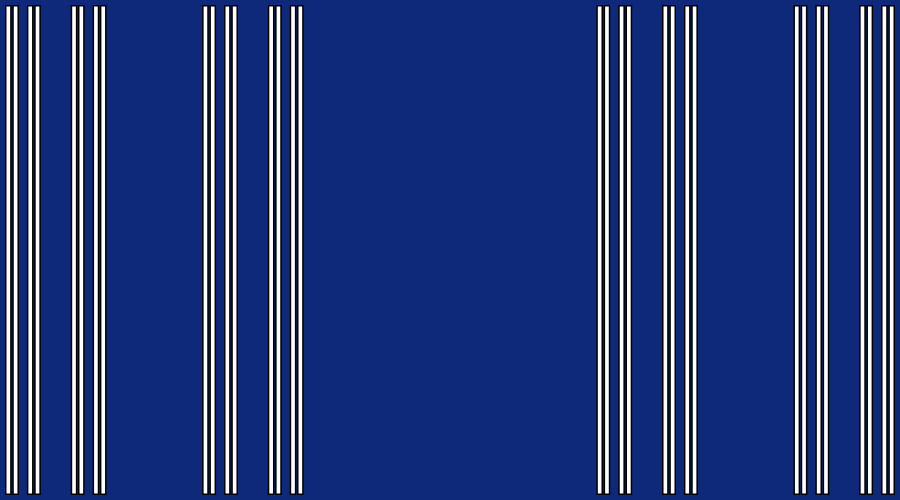This utility lets you draw colorful and custom Cantor comb fractals. You can control the number of comb's teeth and size by adjusting the iteration level and dimensions. The dimensions can be customized by setting the height and width of the canvas and its padding. There are three colors you can choose for the comb – comb color, comb border color, and background color. You can also use additional customization functions to get even more unusual results, such as Cantor stripes and ternary fractal sets. Fun fact – the n-th iteration level the Cantor fractal generates 2⁽ⁿ⁻¹⁾ new segments. Created by fractal fans from team Browserling. Fractabulous!
This utility lets you draw colorful and custom Cantor comb fractals. You can control the number of comb's teeth and size by adjusting the iteration level and dimensions. The dimensions can be customized by setting the height and width of the canvas and its padding. There are three colors you can choose for the comb – comb color, comb border color, and background color. You can also use additional customization functions to get even more unusual results, such as Cantor stripes and ternary fractal sets. Fun fact – the n-th iteration level the Cantor fractal generates 2⁽ⁿ⁻¹⁾ new segments. Created by fractal fans from team Browserling. Fractabulous!

This online browser-based tool allows you to visualize Cantor fractals. The Cantor fractal, also known as the Cantor comb, was first discovered by Henry John Stephen Smith in 1874 and introduced to a wider public by German mathematician Georg Cantor in 1883. It's a self-similar fractal because at each iteration step it is equal to two copies of itself, only reduced in size by one third. There are three popular variations of this fractal. The first one is regular symmetric Cantor fractal (also known as ternary Cantor fractal), the second is Cantor comb and the third is Cantor stripe code. All these fractals are constructed by cutting and deleting segments from the line interval [0, 1]. At the first iteration level, we remove interval [1/3, 2/3] from the middle. The length of this interval is 1/3. At the second step, we remove two 1/9 intervals. At the third step, we remove 4 intervals with total length 1/27, etc. At the n-th step, the segment length is 3⁽¹⁻ⁿ⁾ of the original segment. If this operation is performed infinitely long, it creates the true Cantor fractal, which is a perfect set that is nowhere dense. Mind blowing and ingenious at the same time, or as we love to say – fractabulous!
This online browser-based tool allows you to visualize Cantor fractals. The Cantor fractal, also known as the Cantor comb, was first discovered by Henry John Stephen Smith in 1874 and introduced to a wider public by German mathematician Georg Cantor in 1883. It's a self-similar fractal because at each iteration step it is equal to two copies of itself, only reduced in size by one third. There are three popular variations of this fractal. The first one is regular symmetric Cantor fractal (also known as ternary Cantor fractal), the second is Cantor comb and the third is Cantor stripe code. All these fractals are constructed by cutting and deleting segments from the line interval [0, 1]. At the first iteration level, we remove interval [1/3, 2/3] from the middle. The length of this interval is 1/3. At the second step, we remove two 1/9 intervals. At the third step, we remove 4 intervals with total length 1/27, etc. At the n-th step, the segment length is 3⁽¹⁻ⁿ⁾ of the original segment. If this operation is performed infinitely long, it creates the true Cantor fractal, which is a perfect set that is nowhere dense. Mind blowing and ingenious at the same time, or as we love to say – fractabulous!
In this example, we generate 5 increasing levels of the symmetric Cantor set. At the first recursion level, the length of an interval length is 3⁽¹⁻⁵⁾ = 3⁻⁴ = 1/3⁴ = 1/81, at the second level, it's 3⁻³ = 1/27, at the third, it's 3⁻² = 1/9, at the fourth, it's 3⁻¹ = 1/3, and at the fifth, it's the entire line of length 1. We use a canary color canvas, 600x500 pixels in size with 15-pixel padding. We draw intervals as blocks with a black 5-pixel thick contour and fill them with a deep-sea-green color.
This example draws the comb type of Cantor fractal. This is done by activating the "Comb Mode" option. As a result, all intervals at all recursions are merged together. We remove the padding and generate 6 levels of the comb and it has a total of 32 teeth.
In this example, we enable the "Stripe Code Mode" option to draw the Cantor fractal. This mode deletes all intervals at all iteration levels, except the last level. Then this interval is stretched to fit the entire canvas. There are 2⁽⁶⁻¹⁾ = 2⁵ = 32 stripes in the final drawing as it was iterated 6 times. If the stripe length was 890 pixels (canvas width minus left and right padding) at the first iteration, then at the 6th iteration, each stripe is 1/3⁽⁶⁻¹⁾ = 1/3⁵ = 1/243 of the original length, or 3.66px.
You can pass options to this tool using their codes as query arguments and it will automatically compute output. To get the code of an option, just hover over its icon. Here's how to type it in your browser's address bar. Click to try!
Walk the Hilbert fractal and enumerate its coordinates.
Walk the Peano fractal and enumerate its coordinates.
Walk the Moore fractal and enumerate its coordinates.
Encode the Hilbert fractal as a string.
Encode the Peano fractal as a string.
Encode the Moore fractal as a string.
Encode the Cantor set as a string.
Encode the Heighway Dragon as a string.
Encode the Sierpinski fractal as a string.
Generate a Sierpinski tetrahedron (tetrix) fractal.
Generate a Cantor's cube fractal.
Generate a Sierpinski-Menger fractal.
Generate a Jerusalem cube fractal.
Generate a Jeaninne Mosely fractal.
Generate a Mandelbrot tree fractal.
Generate a Barnsley's tree fractal.
Generate a Barnsley's fern fractal.
Generate a binary tree fractal.
Generate a ternary tree fractal.
Generate a dragon tree fractal.
Generate a de Rham curve.
Generate a Takagi-Landsberg fractal curve.
Generate a Peano pentagon fractal curve.
Generate a tridendrite fractal curve.
Generate a Pentigree fractal curve.
Generate a lucky seven fractal curve.
Generate an Eisenstein fractions fractal curve.
Generate a Bagula double five fractal curve.
Generate a Julia fractal set.
Generate a Mandelbrot fractal set.
Generate a Mandelbulb fractal.
Generate a Mandelbox fractal.
Generate a Buddhabrot fractal.
Generate a Burning Ship fractal.
Generate a toothpick sequence fractal.
Generate an Ulam-Warburton fractal curve.
Generate an ASCII fractal.
Generate an ANSI fractal.
Generate a Unicode fractal.
Generate an emoji fractal.
Generate a braille code fractal.
Generate a fractal in audio form.
Create a fractal that looks like one but isn't a fractal.
Generate a fractal from any text.
Generate a fractal from a string.
Generate a fractal from a number.
Join any two fractals together.
Create a completely random fractal.
Set up an arbitrary IFS system and iterate it.
Recursively transform an image using IFS rules.
Run infinite compositions of analytic functions.
Create a surface that mimics a natural terrain.
Create a fractal surface via Brownian motion.
Apply fractal algorithms on your image and make it self-similar.
Find fractal patterns in any given image.
Find fractal patterns in any given text.
Find fractal patterns in any given number.
Tessellate a plane with fractals.
Run a cellular automaton with custom rules.
Play Conway's Game of Life on an infinite grid.
Subscribe to our updates. We'll let you know when we release new tools, features, and organize online workshops.
Enter your email here
We're Browserling — a friendly and fun cross-browser testing company powered by alien technology. At Browserling our mission is to make people's lives easier, so we created this collection of fractal tools. Our tools have the simplest user interface that doesn't require advanced computer skills and they are used by millions of people every month. Our fractal tools are actually powered by our web developer tools that we created over the last couple of years. Check them out!




